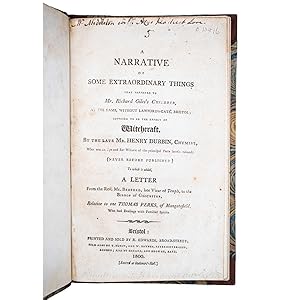Beschreibung
FIRST EDITION, 60pp., contemporary ownership inscription to title head, 8vo, later half calf over marbled boards, spine gilt, green morocco label, Bristol, R. Edwards, 1800. Despite the decrease in interest and involvement in popular manifestations of witchcraft during much of the eighteenth century, other forms of related supernatural belief continued to engage the minds of many educated men and women. Spirit possession and related diabolic phenomena attracted considerable curiosity, not only in the eighteenth century but also in the nineteenth century, when new intellectual interpretations of the supernatural emerged. Durbin s account was a very controversial case of spirit possession. The daughters of Richard Giles, the innkeeper of the Lamb Inn, suffered from strange fits, had crooked pins stuck into them, saw visions, and heard voices. Giles himself later became ill and died. After this tragedy the girls fits subsided for a while before returning again. A local cunning-woman was consulted, who confirmed that witchcraft was responsible, and said that a rival had paid a witch to torment them. The cunning-woman advised that a witch bottle be boiled. This was duly carried out, and the children recovered. The events at the Lamb Inn attracted considerable newspaper attention, and provoked a number of respectable gentlemen, including doctors and clergymen to investigate the affair. Some of them became convinced of the genuineness of the spirit manifestations. A series of questions was put to the spirit in a number of languages to remove suspicion of fraud, and they were apparently completely answered using a series of taps. From this they found that the spirit was actually tormenting six people at the same time. All the Anglican clergymen involved declined to conduct prayers for the girls except for a curate with the methodist learnings of Thomas Rouquet. This is not surprising. While some Anglican clergymen undoubtedly believed in diabolic possession, they were forbidden under Canon 72 (formulated in 1604) to conduct fastings and prayers for the possessed. The author of the tract, Henry Durbin, was a local pharmacist who personally witnessed some of the incidents, and organised an investigation which included a number of pious local notables questioning the spirit as to its actions. His account was only published posthumously on his own instructions, because he was abused in the public Papers . Should I publish the Narrative, the same abuse would be revived, and I wish to live and die in peace with all men. A scarce work with only three copies in UK libraries, and eight in the USA. [ESTC T139120; Witchcraft, Magic and Culture 1736-1951, Davies, 1999]. Bestandsnummer des Verkäufers 6545
Verkäufer kontaktieren
Diesen Artikel melden
![]()

